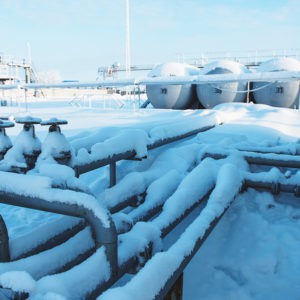New England should have enough power to get through the coming winter, the region’s independent electric grid operator predicted on Tuesday. But along with the prediction came a warning that a a lack of natural gas pipelines puts the region at risk of a winter power shortage.
ISO New England Inc., operator of the region’s power grid, expects to have sufficient supplies to meet New England’s electric needs this winter, in part thanks to a projected warmer-than-usual winter. ISO New England projects electricity demand to fall 1.5 percent below last winter’s peak for normal weather conditions and 1.7 percent below its peak for extreme cold.
And yet, the grid operator pointed out that New England remains at risk of running out of power during periods of peak demand caused by extreme cold.
Peter Brandien, vice president of System Operations & Market Administration, said in a statement that “if the region experiences an extended period of extreme cold weather, fuel supplies into the region could become constrained resulting in challenging system operation.”
The agency noted that a shortage of natural gas pipelines is cause for concern.
“Consecutive days of extremely cold weather can reduce fuel availability for generating power due to regional natural gas pipeline capacity constraints,” its announcement stated.
Ashley Brown, executive director of the Harvard Energy Policy Group at Harvard University, agreed with ISO New England’s analysis and said the natural gas pipeline constraint is a “major problem.”
“The fuel is there. The problem is moving it. It’s pipeline capacity, that’s what it is,” he said.
Brown’s comments echo a new report from the North American Energy Reliability Corporation (NERC).
“New England [power] generation continues to be limited by the availability of natural gas,” the NERC report stated.
The report noted that gas supplies are adequate to meet demand even in abnormally cold conditions, however periods of severe and prolonged cold similar to 2018 “can lead to the eventual loss of generation.”
The report more than once referenced the nasty New England winter of 2017-18, which included a blizzard in January of 2018 that dropped up to two feet of snow across the Mid-Atlantic and New England states.
By not building enough natural gas pipelines, New England is taking a risky gamble, Brown said.
“New England has had good luck. I don’t know how else to describe it. One year, Venezuela dumped a bunch of gas. This year it’s a warm winter. It’s a matter of time until it catches up.
“The problem is two difficulties in building pipelines. One is the opposition, whether it’s environmental, whether it’s NIMBY. Then, after all that, you still have the problem of who’s going to finance it.”
The longer the region gambles, the better the odds that the worst-case scenario happens, Brown said.
“The question is, how long will we be lucky in New England?”

